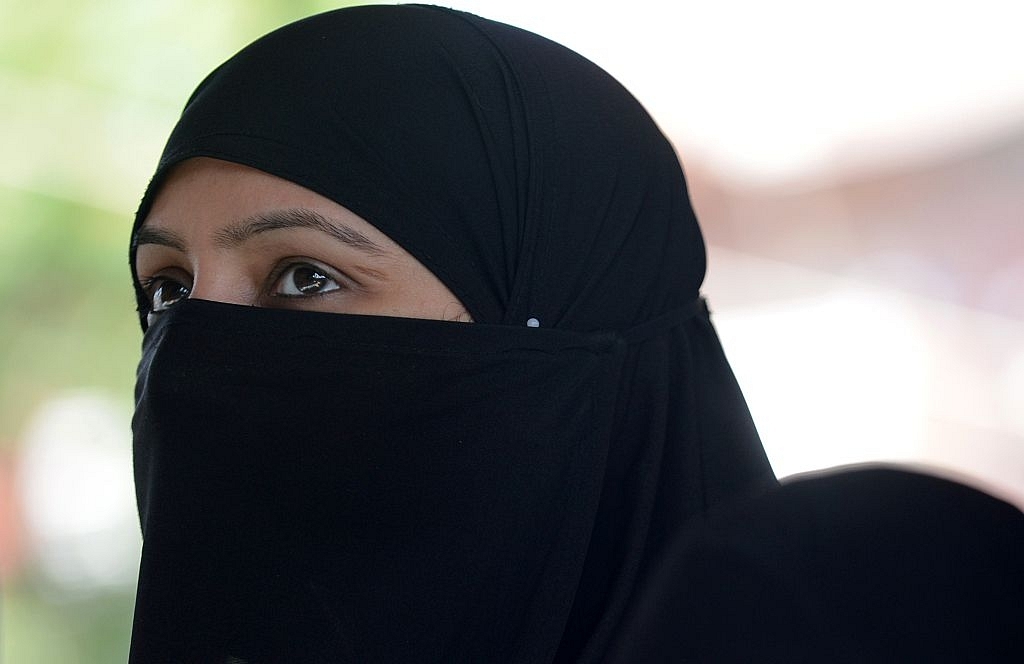Insta
If Islamic States Can Get Rid Of Triple Talaq, Why Not India?

A Kashmiri Muslim woman prays during the first day of the month of Ramadan. (TAUSEEF MUSTAFA/AFP/Getty Images)
A host of Muslim bodies, including the the All India Muslim Personal Law Board (AIMPLB), have strongly opposed what they see as a move to bring in a uniform civil code in the country. They were reacting to an innocuous online questionnaire put up by the Law Commission of India seeking public opinion on the desirability of bringing about the common code as mandated by Article 44 of the Indian Constitution (under Part IV of the Directive Principles of State Policy).
AIMPLB general secretary Maulana Wali Rahmani said Muslims will not respond to the "misleading and divisive" questionnaire. A uniform civil code, he said, would lead to social unrest in the country.
The Maulana's contention is that a uniform code is not suited to a country as diverse as India, and such a code would be against the spirit of the Constitution that guarantees every citizen their right to practise their culture and religion.
What the Maulana and representatives of other bodies like the Jamiat Ulema-e-Hind, Markazi Jamiat Ahle Hadith, All India Milli Council, All India Muslim Majlis-e-Mushawarat, Darul Uloom Deoband and Ittehad-e-Millat Council could not explain is how discriminatory, regressive and medieval practices like the triple talaq, halala (Under this, if a Muslim woman wants to go back to her husband after talaq, she will have to first get married to another man and consummate that marriage!), polygamy, denial of alimony to divorced women and child marriage can be justified in this day and age.
What the Muslim clerics also glossed over is that many countries including Pakistan and Bangladesh have done away with the triple talaq and halala, and countries with a lot of religious and cultural diversity like the United States have a common civil code that Muslims there are perfectly happy with. Also, the Law Commission questionnaire is non-discriminatory since it seeks responses on how to strengthen the inheritance laws for Hindu women and if the two-year waiting period for granting divorce to Christian women is right.
The opposition of the Muslim bodies is, however, political in nature, as is evident from AIMPLB general secretary's charge that the Narendra Modi government had initiated the move (towards a common civil code) "to hide its failures in the last two and half years". What he conveniently forgot was that the Law Commission is an independent body headed by former Supreme Court judge, Dr Justice B S Chauhan. Also, Jamiat Ulema-e-Hind president Maulana Arshad Madani alleged: "Modiji wants to impose dictatorship in the name of democracy.”
The Muslim clerics’ stand is in sharp contrast to the views expressed by Muslim women organisations and prominent women.
Support Swarajya's 50 Ground Reports Project & Sponsor A Story
Every general election Swarajya does a 50 ground reports project.
Aimed only at serious readers and those who appreciate the nuances of political undercurrents, the project provides a sense of India's electoral landscape. As you know, these reports are produced after considerable investment of travel, time and effort on the ground.
This time too we've kicked off the project in style and have covered over 30 constituencies already. If you're someone who appreciates such work and have enjoyed our coverage please consider sponsoring a ground report for just Rs 2999 to Rs 19,999 - it goes a long way in helping us produce more quality reportage.
You can also back this project by becoming a subscriber for as little as Rs 999 - so do click on this links and choose a plan that suits you and back us.
Click below to contribute.
Latest